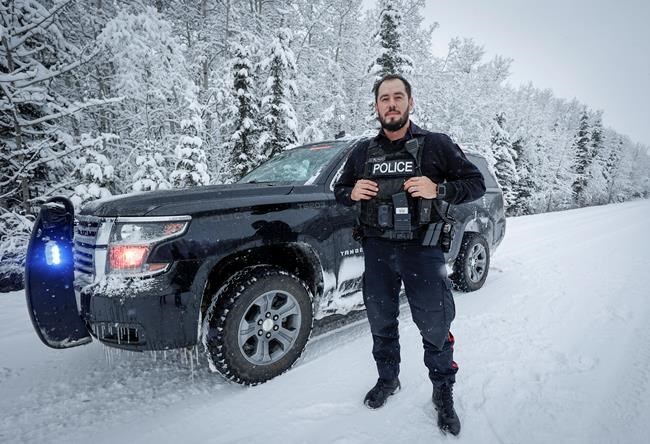
Tsuut’ina Nation Police Service Const. Kenny Big Plume on patrol on the Tsuut'ina Nation, near Calgary, Friday, Dec. 8, 2023.THE CANADIAN PRESS/Jeff McIntosh
December 18, 2023 - 1:00 AM
TSUUT'INA FIRST NATION - Const. Kenny Big Plume knows the snow-covered roads running through the Tsuut'ina reserve like the back of his hand.
Big Plume, 33, was raised by his grandparents on the First Nation, which butts up against the southwest edge of Calgary.
Six years ago, he became a member of the Tsuut'ina Nation Police Service, one of three First Nation forces in Alberta.
"I'm very proud of my culture, of my community," says Big Plume, as he steers the police SUV along icy roads. After several years of living off-reserve, he moved back to Tsuut'ina and built a home for his wife and children.
"This was my way of giving back. This is my way of making an impact, making a difference."
The calls come in slowly on his day shift. He stops to talk to the driver of a car that has slid into the ditch. She has already called for a tow truck.
There are scheduled check-ins and some targeted patrols, including around a Costco and the casino.
"We try to follow the school buses in the mornings to try and make sure people aren't passing the buses," Big Plume adds. "We get a lot of complaints from the schools and the bus drivers about erratic drivers passing when the red lights are out."
He heads into the police station and locks up his pistol before going to the cells, where brightly coloured murals by local artists stretch across some of the walls. It makes them "a little more homey" and "brings our culture into things," he says.
The cells usually house two or three prisoners each night. During the summer powwow season, he says, there can be up to 20.
Big Plume used to work as a welder and says the transition to police officer wasn't easy for the first couple years, as many of the 2,000 residents know who he is, and some are family and friends.
He's had to respond to calls at his parents' place and homes of his cousins and friends.
"I've been on calls where people know where I live," he says. "I've had people threaten to come to my house.
"But that's the life I chose."
He says he has lost some friends through his career. "But it weans out good friends from bad friends."
But being a member of the reserve also makes people more comfortable speaking with him, he says.
"I find that people trust me more. I'm able to relate to people and people open up to me more than they would with someone they don't know."
The sprawling reserve, covering 283 square kilometres, has seen a jump in construction, with shopping centres and restaurants, as well as an additional 35,000 vehicles a day on its roads.
There are 31 officers with the Tsuut'ina force. Police Chief Keith Blake started leading the team 11 years ago after spending 25 years with the RCMP.
There has been an 87 per cent increase in calls for service on Tsuut'ina over the past year, he says.
But the focus remains on community policing.
"Every community wants to see a little bit of themselves in their service and, in the case of ours, 68 per cent of our service self-identifies as Indigenous. We've got a good, diverse group of people," says Blake.
"Every month, every one of our officers ... have to account for how many community events they went to, how many mentorships with youth or with elders. 'How many elders did you visit?'
"We track those. And I say they're more important than how many tickets you wrote."
The band prefers diversion in dealing with those accused of crimes.
Established in 2000, the Tsuut'ina Peacemaking Court was the first Indigenous court in Canada. It has jurisdiction over criminal, youth and bylaw offences committed on the reserve.
"We have a courtroom that has an Indigenous judge, an Indigenous prosecutor and Indigenous court workers," says Blake.
He recognizes Indigenous communities haven't traditionally had a good relationship with law enforcement.
"It still is a problem. We tend to forget in Indigenous communities ... there's a blood memory of what took place with residential schools and the role policing had in taking children away from those homes," Blake says.
"We have to overcome that perception. We have to do it through the deeds that we do, the words that we say and we have to continue to do that."
Prime Minister Justin Trudeau promised in 2020 to bring forward a First Nations policing law. Calls for legislative change were renewed after 11 people were killed and 17 injured in a stabbing rampage on the James Smith Cree Nation in Saskatchewan in 2022.
Doug King, a justice studies professor at Mount Royal University in Calgary, says there are close to 40 First Nation police forces in Canada, with the majority in Quebec and Ontario.
First Nation forces let Indigenous communities distance themselves from their history with the RCMP, he says.
"Moving away from that, in many ways, is liberating for many Indigenous communities, but it also allows for a more tailored community response," King says.
"The more a community can identify with their police officers, the better they feel about it. And it also leads to intelligence sharing, which is vital for crime prevention and crime detection."
This report by The Canadian Press was first published Dec. 18, 2023.
News from © The Canadian Press, 2023